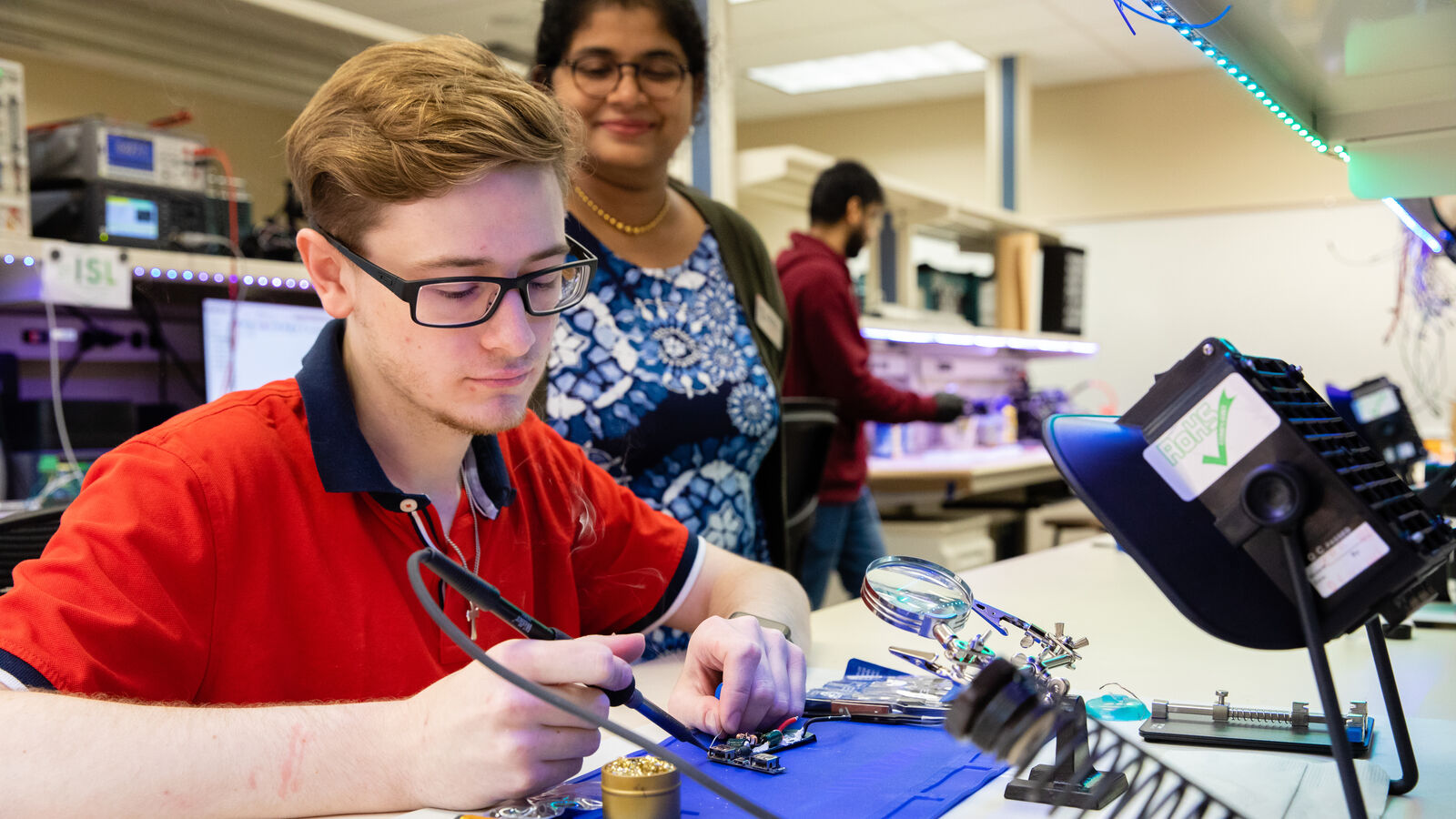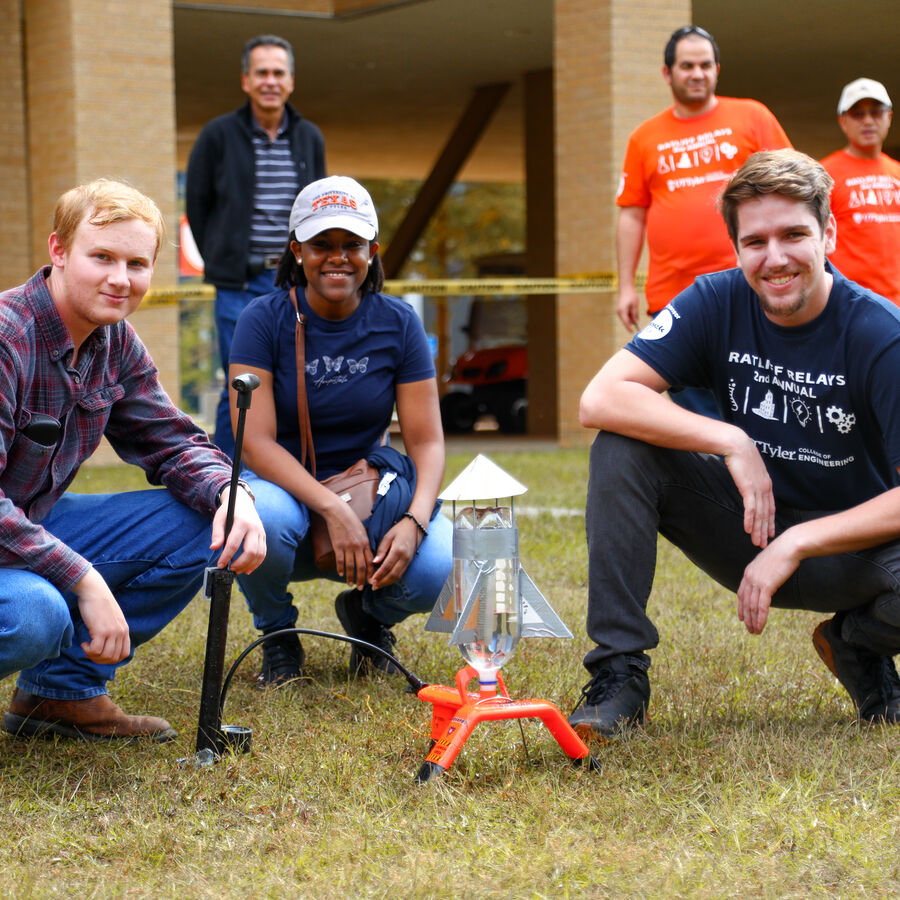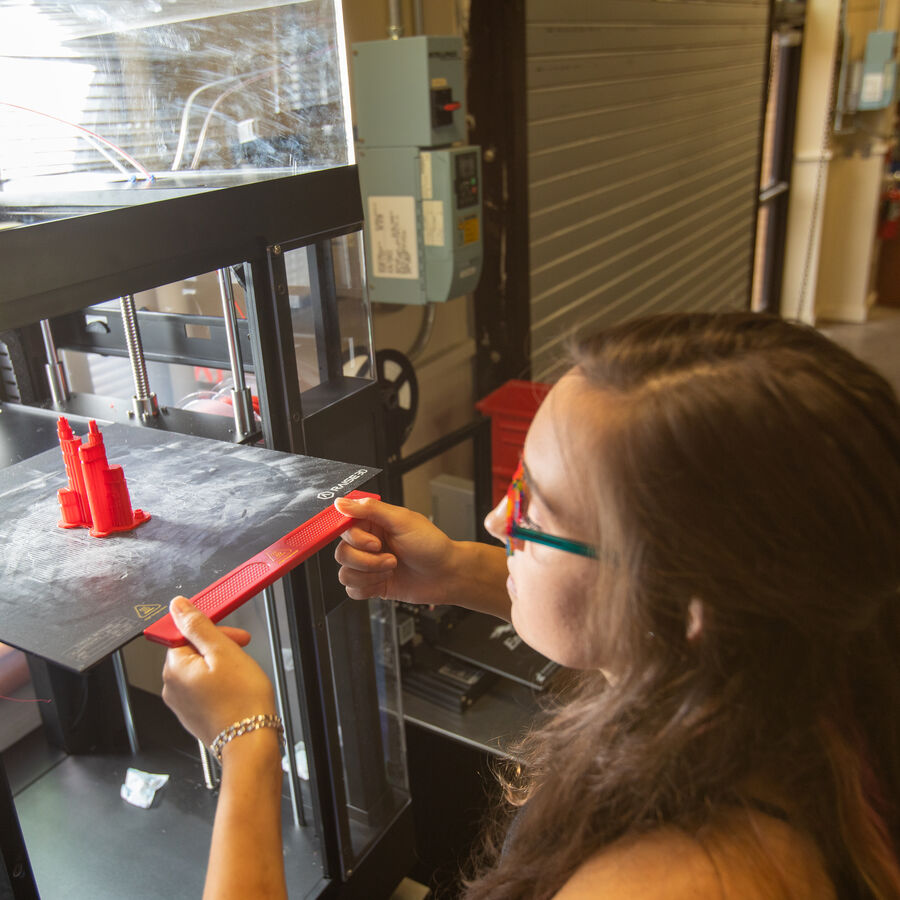
Bachelor of Science in Electrical Engineering
The Lifeblood of Modern Society
Every industry and facet of modern life requires electrical engineers, and their contributions are the basis of power, communications and computer systems. Electrical engineers support their communities and the economy through innovation. They work at the forefront of practical technology, designing the devices and systems we use every day, thereby advancing technology for humanity.
The Bachelor of Science in Electrical Engineering serves as an entryway into the industry, providing a solid foundation to work as a practicing engineer or begin graduate studies through a comprehensive curriculum and multiple hands-on experiences.
Our graduates are involved in professional practice through the application of problem-solving skills, using relevant technology in their field. They demonstrate professional leadership skills through effective communication, critical thought, creativity and teamwork. They integrate engineering principles and social, business and ethical issues into modern society in the process of decision making and are professionally engaged in serving the needs of business, industry, government and academic organizations.
Why Major in Electrical Engineering at UT Tyler?
Electrical engineers are at the forefront of technological innovation and create new products in fulfilling careers. Communities rely on their expertise to keep the lights on and our homes and businesses functioning smoothly, while organizations seek out these professionals to develop new devices and systems.
Graduates of UT Tyler’s Bachelor of Science in Electrical Engineering program find work, as well as competitive salaries, in virtually every industry. Drive innovation and develop advanced solutions in energy and power, telecommunications, electronics, technology or healthcare, among other fields, in roles related to design, development, research, applications, operations, control systems, digital signal processing, electromagnetics, digital and analog electronic circuits, physical electronics, computer-aided design or power systems. They grow professionally through activities such as graduate study, continuing education, professional licensure and participation in technical societies.
Our strengths:
- Expert Faculty: Receive individual attention from student-focused faculty dedicated to professional excellence and bringing extensive experience from the field.
- A Choice of Locations: Choose to study at our main campus in Tyler or through our satellite program at the Houston Engineering Center, located on the Houston Community College campus.
- State-of-the-Art Facilities: Develop critical skills for your career in advanced facilities, such as the Advanced Sensors and Big Data Analytics Center and the Trane Residential Heating and Cooling Lab.
- Hands-on Experience: The department's practical approach to engineering connects theoretical knowledge with real-world design applications. Grow your résumé through the laboratory program and a Student Enrichment Experience, and illustrate how your knowledge delivers results through your capstone project.
- Undergraduate Research: Work with faculty researchers who enjoy inspiring students to think outside the box with electrical engineering principles.
- Robotics Team: Build and program a robot for competition as a student member of the Institute of Electrical and Electronics Engineers. Our team recently placed in the top 10 in an IEEE robotics contest that included collegiate teams from 11 states.
- Nationally Ranked: U.S. News & World Report named UT Tyler’s College of Engineering one of the top 50 engineering programs in the U.S. For the second consecutive year, UT Tyler is the highest-ranked Texas public institution on the publication’s Best Undergraduate Engineering Programs (no doctorate) list.
- Nationally Accredited: The University of Texas at Tyler’s electrical engineering program is accredited by the Engineering Accreditation Commission of ABET. With ABET accreditation, students and employers can be confident that a program meets the quality standards that produce graduates prepared to enter a global workforce.
Curriculum
The Bachelor of Science in Electrical Engineering (BSEE) is a four-year program accredited by the Accreditation Board for Engineering and Technology (ABET). The electrical engineering curriculum offers classes covering subjects including but not limited to Electronic Circuit Design, Communication Systems, Power Electronics, Power Systems, Microprocessors, Real-Time Systems, Computer Architecture, Automatic Control Systems, Digital and Analog Signal Processing, Semiconductors, Instrumentation, Motors and Generators. The program culminates in a senior capstone design experience, where the students work on interdisciplinary teams to build functional prototypes of products.
All BS in electrical engineering students receive a solid, broad-based education with a strong theoretical foundation, practical engineering skills and experience in communication and teamwork in preparation to enter the workforce as a professional engineer or to begin graduate studies.
Core Requirements
Take courses in electric circuits, electronics, digital systems design, electromagnetics, control systems, signal processing, communication systems and power systems. This sequence exposes you to the skills expected of entry- and higher-level engineering professionals, including technical communications, engineering analysis and design.
Seniors may choose specialized senior-year electives, from electrical power engineering, image processing and bioengineering to computer and microchip design or technical areas outside electrical engineering like computer programming.
Electrical Engineering Major Requirements Visit the Electrical Engineering Department
What Can You Do With a Bachelor’s Degree in Electrical Engineering?
Our BSEE program prepares students for exciting and fulfilling careers in a variety of industries and businesses. The ABET accreditation enables them to pursue opportunities in the government and defense sectors. Our graduates can expect to find themselves employed in a variety of positions, including design engineers, supervisors, electrical engineers, software engineers, computer engineers and sales and marketing engineers. Growth in the field of electrical engineering has started to accelerate in response to emerging technologies and innovations in current models, methodologies and design. The Bureau of Labor Statistics predicts steady demand for electrical engineers over the next decade.
Electrical engineering graduates go on to careers in countless industries, including telecommunications, electronics manufacturing, public utilities, aerospace, energy, transportation and solid-state engineering. Our graduates work with top organizations, including NASA, Lockheed Martin, Trane Inc., IBM and Intel, among many others
How to Apply
The University of Texas at Tyler offers a streamlined admissions process for all undergraduate students. Have questions or concerns? Our admissions team can guide you through all requirements and answer any questions you may have. Reflecting our reputation as one of the most affordable colleges in the state, our financial aid team helps you explore all scholarships, grants and other forms of assistance.
For admissions decisions in general:
UT Tyler automatically accepts students from the Top 25% of graduating classes in Texas.
Students from the 2nd to 4th quartiles must have a 2.75 or higher GPA.
Ready to apply? Review all undergraduate requirements to get started.
Start Your ApplicationUT Tyler has established partnerships with community colleges across Texas, allowing for a seamless transfer of your credits. Our relationships let you stick with your degree plan and graduate on time, right on your schedule.
Through UT Tyler’s partnership with Houston Community College, students have the opportunity to earn a Bachelor of Science degree in engineering at the UT Tyler Houston Engineering Center, located on the second floor of the HCC Alief Hayes Campus in Houston.
Students begin coursework at HCC and earn an associate degree before transferring to UT Tyler. As a student considering this pathway, you then select from majors in mechanical engineering, electrical engineering, civil engineering or construction management to finish your bachelor’s at the HEC.
Undergraduate students majoring in electrical engineering may choose to complete a master’s degree in one additional year. Students admitted into the program take nine credits of graduate coursework during their senior year, plus one credit of undergraduate research seminar, and must obtain a grade of B or higher in all graduate courses attempted during their senior year to continue to the master’s program. Those taking this pathway complete two credentials in five years.
July 1
ApplyTexas application opens for incoming first-year students.
October 1
The Free Application for Federal Student Aid opens for the upcoming academic year.
December 1
Application deadline to be eligible for scholarships.
May 1
Deadline for Valedictorian, Salutatorian and Transfer Presidential Scholarships.
August 1
Deadline for Patriot Promise Scholarship.
Explore Related Programs
Next Steps
Take charge of your future. Discover all the places an electrical engineering degree from UT Tyler can take you.


